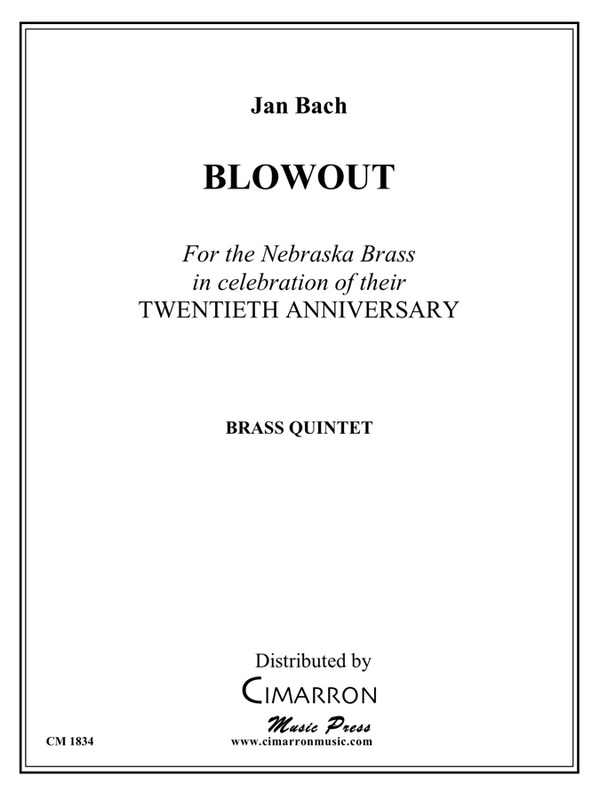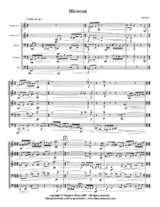 BVD PressStil:
BVD PressStil:  ModerneAusgabe: NotenArt-Nr.: F55981 / CM1834 Level:
ModerneAusgabe: NotenArt-Nr.: F55981 / CM1834 Level:
Jan Bach was born in Forrest, Illinois in 1937. He studied at the University of Illinois in Urbana where he received the Doctor of Musical Arts degree in composition. His performing instruments are French horn and piano. His composition teachers have included Roberto Gerhard, Aaron Copland, Kenneth Gaburo, Robert Kelly, and Thea Musgrave. From 1962 to 1965 he was associate first horn in the U. S. Army Band at Fort Myer in Arlington, Virginia. Upon discharge, he taught for one year at the University of Tampa, Florida, and played in the orchestras of Tampa and St. Petersburg. Since 1966 he has taught theory and composition courses at Northern Illinois University in DeKalb. In 1978 he was selected as one of three professors receiving the Excellence in Teachingaward; in 1982 he was recipient of one of the first eight prestigious Presidential Research Professorship grants instituted by the university. For six years he was Northern Illinois University's nominee for the national CASE Professor of the Year award. Although taking an early retirement in 1998, he continued to teach one course each semester at the NIU School of Music until June of 2004.
Bach has written for virtually every live medium of vocal and instrumental performance. His music has been recognized with numerous composition awards and grants since 1957 when, at the age of nineteen, he won the BMI Student Composers first prize. Other awards have included the Koussevitsky competition at Tanglewood, the Harvey Gaul composition contest, the Mannes College opera competition, the Sigma Alpha Iota choral composition award, first prize at the First International Brass Congress in Montreux, Switzerland, grants from the National Endowment for the Arts and the Illinois Arts Council, the Brown University choral composition award, first prize in the Nebraska Sinfonia chamber orchestra competition, and first prize in the New York City Opera competition. Six times his works have been recommended for a Pulitzer Prize in music.
Many works of Bach have been published by Associated, Carl Fischer, Galaxy, Boosey & Hawkes, Cimarron Music, ITEA Press, and others. Unusual for living composers, his recorded works include multiple performances on vinyl, including four recordings of his brass quintet Laudes, four of Four Two-Bit Contraptions for flute and horn, three of Rounds and Dances, four of Eisteddfod for flute, harp, and viola, five of Concert Variations for euphonium and piano, and other recordings of his brass quintets Triptych, Foliations and Lazy Blues; his work for narrator and chamber orchestra The Happy Prince; Skizzen for woodwind quintet, Quintet for Tuba and Strings, My Very First Solo for alto saxophone and electric piano,Oompah Suite for horn and tuba, and Concerto for Steelpan and Orchestra. Recordings of other works have been distributed for broadcast by NPR and the BBC. Works (many unauthorized) are popping up on YouTube all the time.
Bach has received commissions from the Orpheus Trio, the Chicago Brass Quintet, Harvey Phillips, the Orchestra of Illinois, the International Trumpet Guild, the Greenwich Philharmonia, the Indianapolis Symphony, the Sacramento Symphony, the Biddle Trust, the Pew Memorial Trust, Chamber Music America, and many others. Performance highlights have included his trio Eisteddfod at the 1979 Aldeburgh Festival in England, his opera The Student from Salamanca produced by Beverly Sills for the New York City Opera Company and his 1991 Anachronisms, written for the Vermeer String Quartet and commissioned and broadcast live to 261 FM stations nationwide in its premiere by WFMT, Chicago's Fine Arts radio station.
Within the last few years his concertos for horn, trumpet, harp, and euphonium as well as other works have been performed at international conventions of the horn, trumpet, harp, tuba, trombone, flute, and double-reed associations; in the summer of 1990 selections of his chamber music appeared on programs of virtually every summer music festival in the U.S. In celebration of Dr. Bach's fiftieth year his music was performed in full concerts at the University of Southern Maine and Illinois Wesleyan University. In 1995 his Concerto for Euphonium and Orchestra was chosen for the final round of the international euphonium competition held in Japan every four years. In November of 1995 his Concerto for Steelpan and Orchestra, with Liam Teague as soloist, was premiered at Orchestra Hall in Chicago to enthusiastic reviews, with many additional performances taking place over the past six years. Recently -completed works receiving their premieres early in 1996 include Foliations, written specifically for a recording by the Stockholm Chamber Brass, and The Last Flower, for four musicians/narrators (harp, cello, clarinet, percussion) from the Indianapolis Symphony. In 1997, Variations on a Theme of Brahms was premiered by the Elmhurst Symphony. Premieres in 1998 includeConcertino for Bassoon and Strings, performed by the North Carolina Symphony with Victor Benedict, soloist, and Pilgrimage, a fifteen-minute work for trumpet and piano, performed by Ramon Parcells, soloist, first trumpeter with the Detroit Symphony, who commissioned the work and introduced it at the Interlochen School for the Arts. 1999 saw the completion of two choral pieces, Dear God, for children's chorus, piano four-hands and percussion; and In the Hands of the Tongue, a set of five choral songs for the Cantori singers at Hobart and William Smith Colleges in upstate New York. NIU Music, for French horn and piano, also dates from this period. Works produced in 2000 include The Duel (better known as the Gingham Dog and the Calico Cat) for the Northern Illinois Children's Chorus and piano, andSongs of the Streetwise, a set of seven songs for mixed chorus and steel band based on collected poems of Chicago's homeless people and written for the South Bend Chamber Choir directed by Dr. Nancy Menk. His most recent large-scale work was his Concerto for Tuba and Orchestra, premiered by Jay Hunsberger and the Florida West Coast Symphony's Chamber Orchestra in March, 2003.
Works composed since 2003 include several choral works, a brass trio, a set of duets for horn and tuba, some songs for soprano, flute, harp, and viola, an extended work for English horn and piano, and several other chamber works. Most recently he completed two more groups of duets, one for treble clef instruments (steelpan and violin) and one for bass clef (cello and tuba).
Jan has two daughters: Dawn, a 1991 graduate in musical theater from the University of Iowa, a professional actress and owner of her own redecorating company Eye to Eye Interiors, and Eva, a 2000 Phi Beta Kappa graduate of Hobart and William Smith Colleges who, after returning from three years teaching ESL courses in Japan and getting her masters in that subject from the University of Birmingham UK, is now an administrator at Highline College in Seattle. Jan is also the proud papa to three grand-children, including brand-new Elsa (born February 2015).
Jans biography is published in the eighth edition of Bakers Biographical Dictionary of Musicians, every edition since 1974 of Whos Who in America, two editions of the International Whos Who in Music, the ASCAP Biographical Dictionary, the 2000 online edition of Groves Dictionary of Music and Musicians, and several other biographical journals. There is an extensive biography of him onWikipedia in addition to Sigma Alpha Iotas Pan Pipes, and many others to be found on the internet. He is a composer member of Broadcast Music, Inc.






